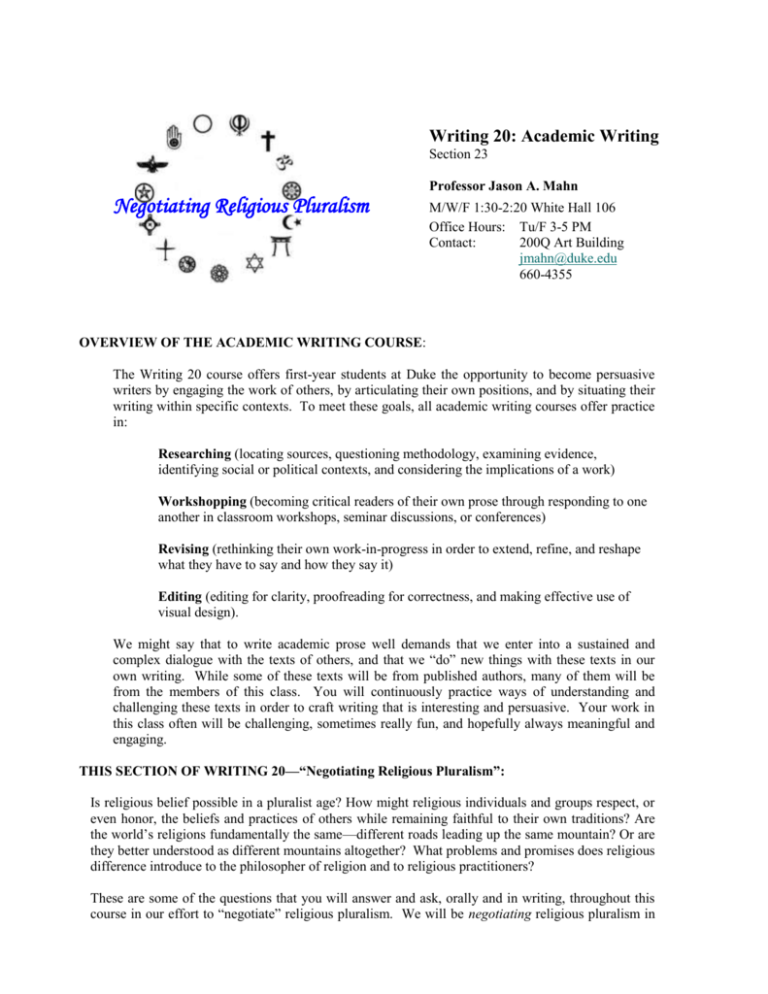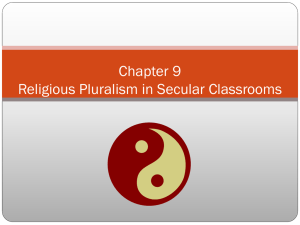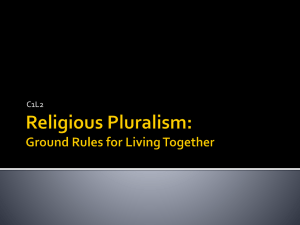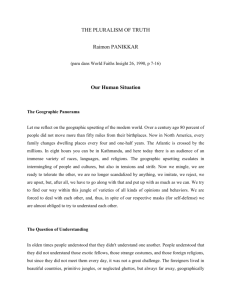Syllabus - Thompson Writing Program
advertisement

Writing 20: Academic Writing Section 23 Professor Jason A. Mahn Negotiating Religious Pluralism M/W/F 1:30-2:20 White Hall 106 Office Hours: Tu/F 3-5 PM Contact: 200Q Art Building jmahn@duke.edu 660-4355 OVERVIEW OF THE ACADEMIC WRITING COURSE: The Writing 20 course offers first-year students at Duke the opportunity to become persuasive writers by engaging the work of others, by articulating their own positions, and by situating their writing within specific contexts. To meet these goals, all academic writing courses offer practice in: Researching (locating sources, questioning methodology, examining evidence, identifying social or political contexts, and considering the implications of a work) Workshopping (becoming critical readers of their own prose through responding to one another in classroom workshops, seminar discussions, or conferences) Revising (rethinking their own work-in-progress in order to extend, refine, and reshape what they have to say and how they say it) Editing (editing for clarity, proofreading for correctness, and making effective use of visual design). We might say that to write academic prose well demands that we enter into a sustained and complex dialogue with the texts of others, and that we “do” new things with these texts in our own writing. While some of these texts will be from published authors, many of them will be from the members of this class. You will continuously practice ways of understanding and challenging these texts in order to craft writing that is interesting and persuasive. Your work in this class often will be challenging, sometimes really fun, and hopefully always meaningful and engaging. THIS SECTION OF WRITING 20—“Negotiating Religious Pluralism”: Is religious belief possible in a pluralist age? How might religious individuals and groups respect, or even honor, the beliefs and practices of others while remaining faithful to their own traditions? Are the world’s religions fundamentally the same—different roads leading up the same mountain? Or are they better understood as different mountains altogether? What problems and promises does religious difference introduce to the philosopher of religion and to religious practitioners? These are some of the questions that you will answer and ask, orally and in writing, throughout this course in our effort to “negotiate” religious pluralism. We will be negotiating religious pluralism in several senses of the term. To negotiate can mean to traverse over a certain terrain, such as the landscapes of different religions. This landscape can be as large as the world (where “Eastern” religions meet “Western” religions), or as small as the community of Durham and the religious life programs at Duke. We will negotiate this terrain by learning about different religious traditions and by “mapping” their relations to one another. But to negotiate also means to manage a complex problem or attempt to settle some disagreement. This second meaning is also applicable to our course insofar as we will come to terms with competing ways of understanding or interpreting religious plurality, extending some and countering others, in an effort to develop our own claims. Finally— and most important for this course—to negotiate means to confer with other people and with other texts, to grapple with their ideas, and to situate one’s own proposals or projects within those of others. In “negotiating religious pluralism,” then, we will not only learn about different religions and develop our own interpretations; we will also continuously draw upon, extend, counter, call into question, and otherwise rely upon the work of others in our thinking and writing. NARRATIVE OF THE COURSE: In this course we will examine the problems and promises of religious pluralism, beginning with those described by Diana Eck in Encountering God: A Spiritual Journey from Bozeman to Banaras. After “coming to terms with,” “forwarding,” “countering,” and “taking an approach from” Eck’s book in a series of short writing projects, you will assemble and revise parts of these projects into one unified longer project (about 68 pages). In the second unit, we will consider how questions of religious pluralism change when considering the “sibling” religions of Judaism, Christianity, and Islam. This second unit will culminate in a second longer writing project (about 6 pages) in which you will explore the particular problems and promises of diversity within the monotheistic religions. This project will be revised extensively in consultation with your professor and classmates. In the third and final unit, you will “go local” as you conduct new research on religious pluralism within Durham and Duke in an effort to read other kinds of texts (websites, interviews, religious rites, etc) together with published material. Your final project (also written through multiple drafts) will be either to revise and extend one of your two previous longer projects in light of these new, local findings (about 10-12 pages) or to write a new, third writing project addressing religious diversity in Durham or at Duke (6-8 pages). We might identify three narratives or progressions that describe the arch of this course. First, we will learn to read and respond to more diverse kinds of texts. We begin by reading published texts and those of our classmates, come to also consider cultural/popular texts (film, websites, etc), and then also ethnographic recordings of religious rites, worship, and meditation. Second, as this course progresses, our subject matter gets closer and closer to “home.” That is, we begin by considering western encounters with eastern religions (“Bozeman meets Banaras”); we then trace how the conversation changes when we limit our investigation to the historically-related “religions of the book”; finally, we analyze where and how such religious interactions happen here in Durham and at Duke, and think about what difference these local interactions make for theorizing about religious pluralism. Over the course of this journey we thus move from the theoretical/global to the practical/regional (and back again). Finally—and most importantly—our writing over the course of the semester will be cumulative and recursive. The first major writing project on Eck’s book will incorporate and revise much of your smaller writing projects; the second major writing project will reconsider theories such as those of Eck in light of interactions between the monotheistic religions; and the final major writing project will either revise one of the first two projects in light of new, local evidence, or use the contexts of your earlier writings as a platform for exploring the novelty of pluralism at Duke. WRITING PROJECTS, OTHER ASSIGNMENTS, AND PEER CRITIQUES: Six shorter writing projects. About 2-3 pages each. You will receive comments on each of these from classmates and/or myself, as well as a check [√], check-plus [√+] or check-minus [√-]. I will list the specific criteria by which you will be evaluated in each writing assignment First Major Writing Project: A Critical Review of Eck’s Encountering God. This project is actually an assembly, extension, and revision of some of your shorter writing projects. It will be a critical review of Eck’s book, similar to those written for popular journals (about 6-8 pages). Second Major Writing Project: Intertextual Essay: Reading American Religious Culture through Academic Theology (and vice-versa). This project will give you the chance to identify and scrutinize supersessionism—or other relations between Judaism, Christianity, and Islam—by working with published materials, your ethnographic writings, and one or more popular text. You will be able to consider how negotiating religious pluralism changes when one considers interactions between “religions of the Book” and when those interactions take cultural-political forms (about 6 pages). Third Major Writing Project: Negotiating Religious Pluralism at the Global and Local Levels. The third writing project will include new research that you conduct or gather related to religious diversity and dialogue in Durham or at Duke. You may chose to incorporate this new material into a previous project (about 10-12 pages) or use a previous project to introduce and contextualize a substantively new project (about 6-8 pages). In-class SWP workshops: Once in the first half of the course you will have your SWP “workshopped” by the entire class. Please post this project to Communications>File Exchange the night before class so that members of the class can consider it in advance. Then, please bring 13 copies of your SWP to class so that the class can discuss and learn from it. Short Informal Writing Assignments: These are short homework assignments that will aid class discussion. Specific assignments for this work are given in the “daily schedule” section of this syllabus. Additional directions or clarification will be given by me orally during the class before it is due. Small Group Workshops/Written Critiques: We will critique the first draft of each student’s second and third Major Writing Project in small groups. In the sessions, each author will read her or his work, and the rest of the small group will then help the author rethink his or her primary moves. To prepare for the small group workshop, you will carefully read two of your colleagues’ written work and prepare written comments according to a specific prompt. TEXTS: Eck, Diana L. Encountering God: A Spiritual Journey from Bozeman to Banaras. Boston: Beacon, 2003. Harris, Joseph. Rewriting: How to do Things with Texts. Logan, UT: Utah State University Press, 2006. Philosophical and theological articles, available on E-Reserve in Blackboard.








